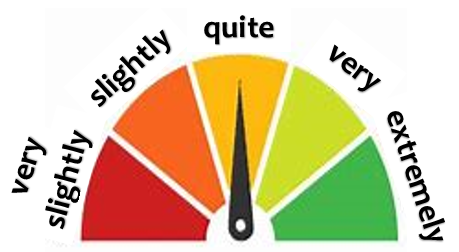Adverbs of degree tell us the intensity or degree of an action, adjective or another adverb. They answer the question ‘how much?‘ or ‘to what extent?‘



We can use these words to modify the meaning of adjectives:
Consider the example:
How was his football match?
- It was extremely good.
- It was very / really good.
- It was good.
- It was quite good.
- It wasn’t very good.
- It wasn’t very good at all.
We can also use these words to modify the meaning of adverbs:
Consider the example:
How did he play?
- He played extremely well.
- He played very / really well.
- He played well.
- He played quite well.
- He didn’t play very well.
- He didn’t play very well at all.
So / Such
We can use ‘so’ and ‘such’ to make adjectives stronger:
1. [so + adjective]
- The football match was so good.
2. [such + (a) + adjective + noun]
- It was such a good football match.
We can also use ‘so’ to make adverbs stronger:
3. [so + adverb]
- I played so well.
We can also use ‘so… (that)’ and ‘such… (that)’. We often leave out ‘that’.
- The football match was so good (that) nobody wanted to go home.
- It was such a good football match (that) nobody wanted to go home.
- I played so well that I scored two goals.
Too / Enough
1. We can use the structures [too + adjective] and [too + adverb] to say that there is a problem. It means ‘more than is good’ or ‘more than is necessary’:
- We’re not going outside because it’s too cold.
- This apartment is too small for us to get a dog.
- He swam too slowly to win the race.
2. We can use [not + adjective + enough] or [not + adverb + enough] in a similar way:
- It’s not warm enough to go outside today.
- I don’t think we can get a dog – our apartment isn’t big enough.
- He didn’t swim quickly enough to win the race.
3. We can also use the positive form [adjective + enough] or [adverb + enough]:
- I think this pizza will be big enough for four people.
- Martin is 17 so he is old enough to get a driver’s licence.
- He did well enough in the exam to get into university.
4. We can say [too / enough… for somebody / something].
- There wasn’t enough room for us to stretch our legs out.
5. We can also say [too / enough… to do something].
- He’s too small to reach the door handle.
Almost & nearly
We can use ‘almost’ or ‘nearly’ to modify the meaning of verbs:
- I remembered my passport two minutes before leaving the house. I almost / nearly forgot my passport.
- I arrived at the airport very late, but I managed to catch my plane. I almost / nearly missed my flight.
Only just
We can also use ‘almost’ in negative sentences. However, it is more common to make a positive sentence with ‘only just’:
- I only just remembered my passport.(This means the same as, ‘I almost didn’t remember my passport’.)
- I only just caught the plane.
- (This means the same as, ‘I almost didn’t catch the plane’.)
Hardly
‘Hardly’ also has a similar meaning to ‘almost not’. We can use it to say that something is only just possible or true.
- I am so excited. I can hardly wait for my next holiday in Mexico.
- The first time I went there, I hardly spoke any Spanish.
‘Almost’, ‘nearly’, ‘only just’ and ‘hardly’ come before the main verb.
When to use
1. Many adverbs of degree like ‘very’, ‘really’, ‘quite’, ‘barely’, ‘not particularly’, etc. can be used with gradable adjectives, making them stronger or weaker:
- This movie is extremely interesting.
- The game was really impressive.
- Your brother is quite talented.
- The street is barely illuminated.
2. Certain adverbs like ‘absolutely’, ‘completely’, ‘totally’, ‘nearly’, ‘practically’, ‘almost’ etc. are used only with non-gradable adjectives. They are used to describe things that possess some quality entirely or almost entirely.
- Our journey was totally fascinating.
- Today I feel myself perfectly well.
- Mary’s new dress is absolutely amazing.
- The students in our university are mostly American.
- These two cars are practically identical.
3. Adverbs ‘really’, ‘fairly’ and ‘pretty’ can be used both with gradable and non-gradable adjectives:
- It’s a really good idea (gradable, meaning the idea is very good).
- It’s a really great idea (non-gradable, meaning the idea is absolutely the best).
4. Adverbs of degree ‘quite’, ‘really’ and ‘absolutely’ can also be used with the verbs. They are put before the verbs to modify their meaning a little.
- I quite enjoy running (meaning it gives me pleasure).
- I really like running (meaning I do it quite often and I like it).
- I absolutely love running (meaning I can’t live without it).
Here’s a good video from Alex Lane explaining how to use adverbs of degree:
Read more about adverbs: